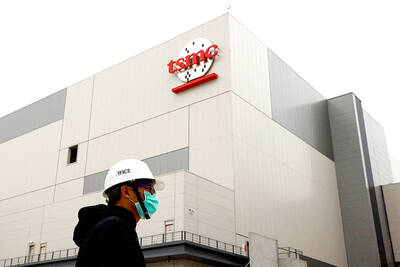Switzerland’s scandal-hit banking giant Credit Suisse Group AG yesterday said that it was appointing a new chief executive as higher litigation costs, financial market volatility and rising interest rates worldwide pushed it deeper into the red in the second quarter.
“Our results for the second quarter of 2022 are disappointing, especially in the investment bank division, and were also impacted by higher litigation provisions and other adjusting items,” outgoing chief executive officer Thomas Gottstein said in a statement.
“The bank’s performance was significantly affected by a number of external factors, including geopolitical, macroeconomic and market headwinds,” said Gottstein, who at the same time announced his resignation at the helm of Switzerland’s second-biggest bank.

Photo: Bloomberg
“Today marks a leadership change for Credit Suisse,” said Gottstein, who joined the executive board in 2015 and was appointed CEO in 2020. “It has been an absolute privilege and honor to serve Credit Suisse over these past 23 years.”
Gottstein is to be replaced by Ulrich Koerner, head of asset management, with effect from Monday next week.
Turning to its quarterly results, Credit Suisse said it booked a net loss of 1.593 billion Swiss francs (US$1.65 billion) in the period from April to last month, wider than the loss of SF273 million in the preceding three months and down from net profit of SF253 million in the second quarter of last year.
“As stated in our trading update on June 8, the second quarter was marked by challenging economic and market conditions,” the bank said.
“The combination of the current geopolitical situation following Russia’s invasion of Ukraine and significant monetary tightening by major central banks in response to the substantial increase in inflation have resulted in continued heightened market volatility, weak customer flows and ongoing client deleveraging,” it said.
Looking ahead, Credit Suisse said it expected the current market conditions “to continue for the coming months.”
Trading so far in the third quarter “has been marked by a continued weakness in client activity, exacerbating normal seasonal declines,” it said.

Stephen Garrett, a 27-year-old graduate student, always thought he would study in China, but first the country’s restrictive COVID-19 policies made it nearly impossible and now he has other concerns. The cost is one deterrent, but Garrett is more worried about restrictions on academic freedom and the personal risk of being stranded in China. He is not alone. Only about 700 American students are studying at Chinese universities, down from a peak of nearly 25,000 a decade ago, while there are nearly 300,000 Chinese students at US schools. Some young Americans are discouraged from investing their time in China by what they see

Taiwan Semiconductor Manufacturing Co (TSMC, 台積電), the world’s largest contract chipmaker, yesterday reported record sales for the first quarter, which analysts attributed to solid demand for emerging technologies. Consolidated revenue totaled NT$592.64 billion (US$18.51 billion) in the January-to-March period, up 16.5 percent from a year earlier, but down 5.26 percent from the previous quarter, TSMC said in a statement. The first-quarter revenue beat analysts’ average projection of NT$579.5 billion, Bloomberg News reported. That performance lends weight to expectations that the world’s most valuable chipmaker would return to solid growth this year after weathering a post-COVID-19-pandemic cratering of smartphone and computer sales. TSMC is budgeting

MAJOR DROP: CEO Tim Cook, who is visiting Hanoi, pledged the firm was committed to Vietnam after its smartphone shipments declined 9.6% annually in the first quarter Apple Inc yesterday said it would increase spending on suppliers in Vietnam, a key production hub, as CEO Tim Cook arrived in the country for a two-day visit. The iPhone maker announced the news in a statement on its Web site, but gave no details of how much it would spend or where the money would go. Cook is expected to meet programmers, content creators and students during his visit, online newspaper VnExpress reported. The visit comes as US President Joe Biden’s administration seeks to ramp up Vietnam’s role in the global tech supply chain to reduce the US’ dependence on China. Images on

US CONSCULTANT: The US Department of Commerce’s Ursula Burns is a rarely seen US government consultant to be put forward to sit on the board, nominated as an independent director Taiwan Semiconductor Manufacturing Co (TSMC, 台積電), the world’s largest contract chipmaker, yesterday nominated 10 candidates for its new board of directors, including Ursula Burns from the US Department of Commerce. It is rare that TSMC has nominated a US government consultant to sit on its board. Burns was nominated as one of seven independent directors. She is vice chair of the department’s Advisory Council on Supply Chain Competitiveness. Burns is to stand for election at TSMC’s annual shareholders’ meeting on June 4 along with the rest of the candidates. TSMC chairman Mark Liu (劉德音) was not on the list after in December last